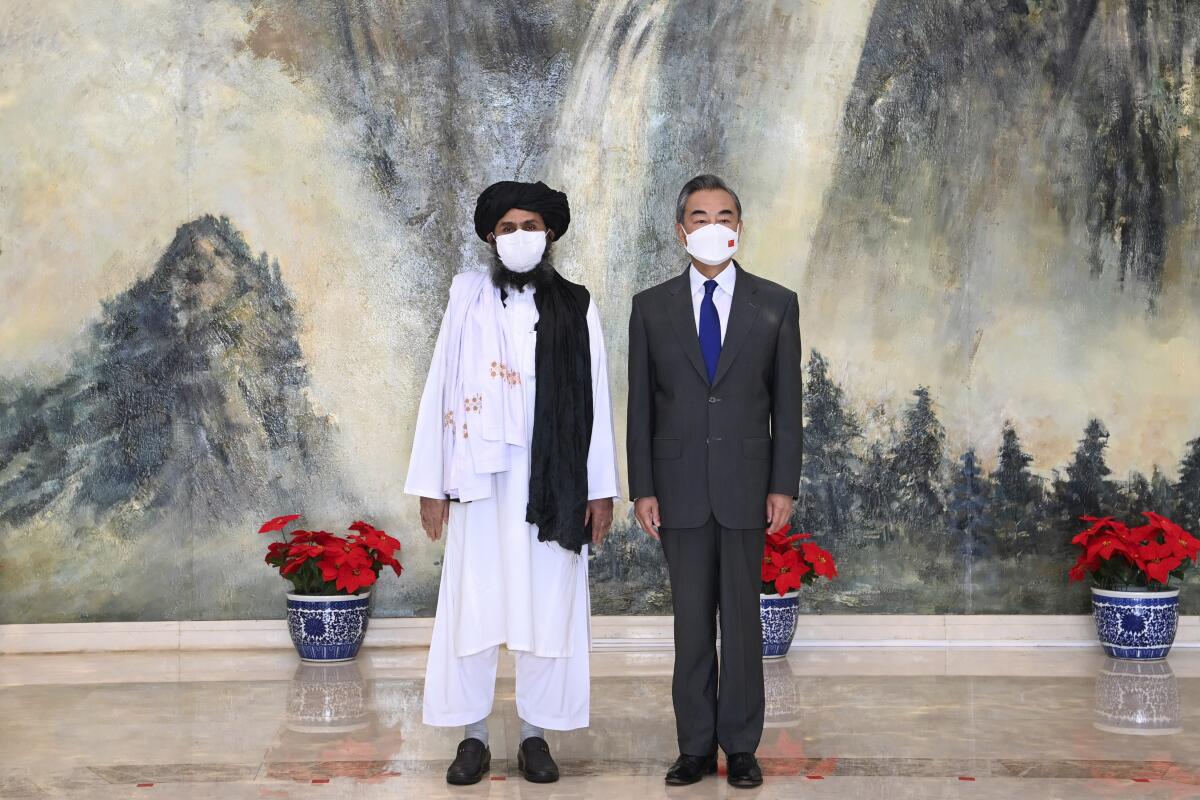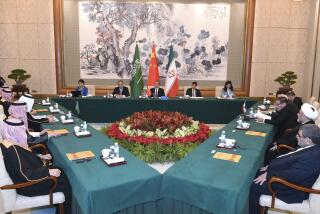‘Do not fall into this trap’: Taliban takeover leaves China uncertain about Afghanistan

- Share via
BEIJING — The Taliban’s stunning victory in Afghanistan has left China facing the troubling prospect that the newly emboldened Islamic fundamentalist regime on its border could upset security and economic interests across the region.
As Afghanistan’s largest and most powerful neighbor, China could step in to fill the power vacuum left by the United States. But it has little desire to do so. Instead, Beijing is expected to focus on improving relations with and countering the ambitions of an extremist regime, even as some have suggested that Washington’s humiliating failure at nation building was a win for China.
The ruling Communist Party was quick to excoriate decades of American interference: “Whether in Iraq, Syria or Afghanistan, we have seen that wherever the American military goes, it leaves behind turmoil and fragmentation, death and destruction, a mess riddled with holes,” said Ministry of Foreign Affairs spokesperson Hua Chunying at a press briefing on Tuesday.
But the deeper concern for China, which in recent years has become more aggressive in asserting its interests across the region, is an uncompromising Taliban that could inspire radical militants beyond its borders. China’s military power and reach is far superior, but Afghanistan could pose a tricky preoccupation.
“This is not influence that they want,” said Andrew Small, a senior fellow at the German Marshall Fund who has written a book about the China-Pakistan relationship. China is using the leverage it has to attain specific goals, he said: protecting its economic interests and ensuring Afghanistan does not become a hub for militant extremists that might attack China.
“Beyond that, there is still this obsession with how Afghanistan is a trap, a graveyard of empires — it sucks in energy, it sucks in money ... it’s how all the major powers end up being dragged down, and they don’t want to do that,” Small said. “The psychology around it is: Do not fall into this trap.”
China had a quiet relationship with the Taliban the last time it was in power in the 1990s. The Chinese ambassador to Pakistan met with Mullah Omar, the Taliban’s leader, in Kandahar in 2000. Chinese companies reportedly then signed contracts to work on telecommunications networks and began fixing Afghanistan’s dams and power grids, according to reporting by Western journalists at the time.
The two sides’ interests were much the same then as they are now: the Taliban needed economic aid and help to fend off U.N. sanctions, while China wanted to prevent Afghanistan from becoming a base of support for the independence movement in its Xinjiang region. Neither side was fully satisfied.
China is now more vigorous on the world stage and is openly seeking a regional leadership role to show Beijing is a more responsible and stable ally than the U.S. But Afghanistan is not where the Chinese wanted to prove that.
China has expanded its influence in Central Asia with massive investments in recent years through President Xi Jinping’s Belt and Road Initiative — in part because an American security presence in the region freed China from having to deal with Afghanistan, said Niva Yau, a researcher focused on China and Central Asia at the OSCE Academy in Kyrgyzstan.
Many of the region’s oil and gas industries have become reliant on China, she said. “Now, with Afghanistan becoming destabilized, all these billions of dollars of investments are at risk because they are extremely close in proximity to the Taliban,” Yau said.
Chinese Foreign Minister Wang Yi discussed Beijing’s concerns with U.S. Secretary of State Antony J. Blinken on Tuesday. Wang criticized the “hasty U.S. withdrawal” and warned that China did not want to see Afghanistan “relapse into a hotbed and shelter for terrorism.”
The fear of Afghanistan harboring extremists, particularly militant groups seeking independence for China’s far western Xinjiang region, has long been central to China’s policy in Afghanistan. In recent years, Chinese authorities have arbitrarily incarcerated an estimated 1 million Uyghurs and other mostly Muslim ethnic minorities in Xinjiang in the name of counterterrorism.
China is now pressuring the Taliban to withhold support from Uyghur militants, some of whom were trained in Afghanistan in the past. In exchange, Beijing can provide Kabul with a veneer of international legitimacy and much-needed help in reconstruction and development that will become critical as billions of dollars in U.S. aid disappears.
Last month, Chinese officials held a meeting with Taliban leaders in Tianjin, a port city near Beijing. They released photos of Foreign Minister Wang Yi with Mullah Abdul Ghani Baradar, the Taliban’s co-founder and political commission leader, in the same room where U.S. Deputy Secretary of State Wendy Sherman had been hosted just days earlier.
Wang called the Taliban an “important military and political force in Afghanistan” and said the group should “make a clean break with all terrorist organizations” including the East Turkestan Islamic Movement, a separatist group from Xinjiang.
Baradar said China had “always been a reliable friend of the Afghan people” and that the Taliban would “never allow any force to use the Afghan territory to engage in acts detrimental to China.”
Beijing told the Taliban such commitments would be “a precondition of the China’s recognition of Taliban power and authority in Afghanistan,” said Shi Yinhong, professor of international relations at China’s Renmin University. But Beijing also has serious reservations about the Taliban, he said.
The Taliban’s victory has inspired extremist groups in the region, whose activities have already disturbed China’s economic activities. Last month, nine Chinese construction workers were killed in a bus bombing in northern Pakistan. Two Chinese engineers were targeted in a shooting in Karachi the same month.
In April, the Chinese ambassador narrowly escaped a suicide bombing by the Pakistani Taliban at a luxury hotel where he was staying in Quetta — though the extremist group said the attack was meant to target police and other officials.
China also cannot fully trust Taliban promises, Yau said, because the group does not have full control over the grassroots realities in Afghanistan.
The Taliban does “not have the final say when it comes to villages which are harboring East Turkestan supporters,” Yau said, referring to the name that separatists use to refer to Xinjiang. “We can see that China is very active in trying to negotiate with the Taliban … but it is still at square one in terms of actually achieving its first political goal of making sure that these East Turkestan people are not supported.”
As for Afghanistan’s postwar reconstruction and development, China is likely to participate but on a limited scale because the country’s political future is uncertain.
“I expect a lot of theatrics around this. It’ll suit both sides to say there is a burgeoning relationship,” Small said. “It’s helpful for China to dangle this to the Taliban. They know China will provide an economic lifeline in a context in which they cannot expect the volumes of aid the previous government was getting from the West.”
The Taliban’s victory also complicates the politics of the region at the same time that the U.S. and China are engaged in a broader struggle for global influence. Analysts say China is feeling that pressure.
“Beijing is aware that one of the primary purposes for the Biden administration’s hurried withdrawal of American troops and the U.S. presence is … to concentrate U.S. resources and energies on checking China in the Indo-Pacific,” said Shi. “The priority has been set.”
More to Read
Sign up for Essential California
The most important California stories and recommendations in your inbox every morning.
You may occasionally receive promotional content from the Los Angeles Times.










